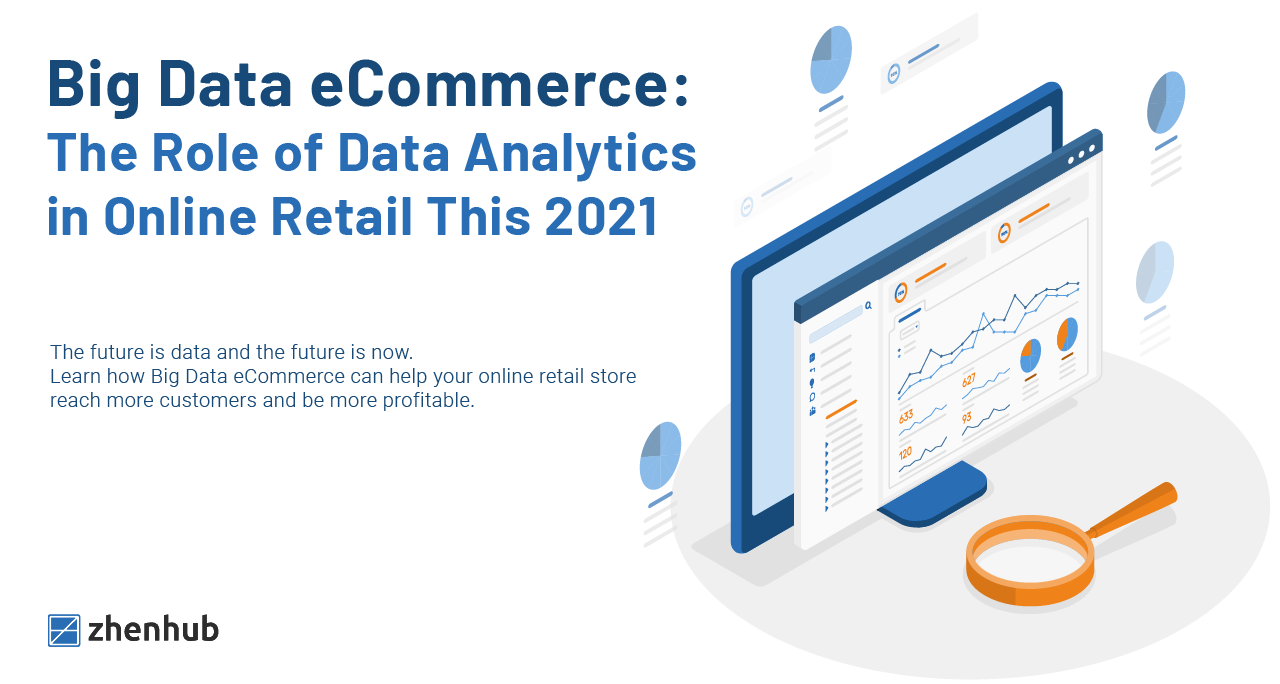
Big Data eCommerce: The Role of Data Analytics in Online Retail This 2021
Time to read: 4 minutes
In today’s digital age, data is continually created, with people producing information at a staggering rate. Each person on the planet makes 1.7 MB of data every second. The problem no longer lies with valuable sourcing info, but it lies with interpreting data and making the numbers useful.
Big Data analytics is instrumental in making Big Data eCommerce happen. It is the next innovation to transform the online transactions industry. Big Data allows online retailers to make better business decisions, pivot operations according to verifiable customer behaviors, and optimize daily operations, among others.
This article explains what Big Data analytics is – its current impact, the benefits eCommerce can derive from it, and the future it holds for online retailers.
What is Big Data analytics?
Analyzing data to make informed business decisions isn’t new. Even in the infancy of commercialization in the 1950s, companies were already using statistics to uncover market trends. But those numbers on spreadsheets is a drop of water compared to the oceans of data in the digital age.
Ninety percent (90%) of all available data were created within the last two years. Big Data analytics examines a large amount of available data to uncover valuable insights and trends. Interpreting big data for businesses starts with 3Vs – volume, velocity, and variety.
The sheer volume of available data at present is difficult to imagine. Take Facebook, for example. In 2018, the social media platform already had 250 billion images in storage, and the information sourced from this one social media platform isn’t limited to pictures. Between email addresses, location, and time stamps, there is a variety of available data from one source. Facebook video posts garner 8 billion views a day.
At its core, Big Data analytics involves condensing a large amount of accumulating data of various types and from multiple sources into valuable information.
The Role of Big Data eCommerce in the Online Retail Industry
According to reports, digital data will grow by 61% in 2025. In five years, 175 zettabytes of information would become available. For reference, one zettabyte is one followed by 21 zeros.
Big Data analytics can help most industries, more so for eCommerce. It can provide organizations with new business insights, improve supply chain and logistics operations, and even provide new revenue and retail channels. Insights gleaned from Big Data eCommerce can change the way online businesses market to consumers and conduct their operations.
Forecast demand
Big Data eCommerce allows companies to discern customer behaviors. Through sourced information, these retailers can predict the products and services that their customers are likely to get at any given time.
Having information on which inventory to stock is empowering for eCommerce stores, especially those starting. Through it, businesses can invest their resources in products that are more likely to sell. Using big data for eCommerce is crucial to the success and longevity of an operation.
Service personalization
It’s known that 75% of online shoppers prefer brands that offer a personalized shopping experience. Sending a personalized message to a potential customer can increase conversion by 8%.
Big Data analytics can shed light on the behaviors, needs, and even sentiments. It paints a clearer picture of who the customer is – their age, gender, social presence, and location. Businesses can use this data and other data sets to shift their operations to improve the customer journey and create better, more personal experiences. It can even be used to address customer’s pain points and expectations.
Moreover, with a specific target audience in tow, companies can tailor their marketing efforts to reach the market they are more likely to convert. It may include product suggestions, customized emails, and special discounts and offerings.
Process automation
Order fulfillment plays a significant role in customer satisfaction. The faster the delivery time, the more satisfied the customer is, the more likely they are to patronize a brand. Big data analysis can improve stocking and inventory management. It can also optimize checkout and delivery times by identifying bottlenecks and suggesting the best solutions to mitigate the problem. It can even predict possible outcomes by analyzing historical patterns.
Improve customer service
Like order fulfillment, customer service is key to customer loyalty. Loyal customers are valuable to businesses because they spend 67% more on brands they patronize. It’s also keen business sense to keep existing ones as acquiring new patrons can be five to ten times more expensive.
Big Data analysis is essential in identifying points of improvement within an eCommerce operation. Knowing the exact pain points allows companies to address these issues and implement sustainable customer service changes based on verifiable data. Through this business intelligence driver, companies can focus more on solutions that are likely to work.
Optimize pricing structures
Customers love a good discount. Seventy-five (75%) of consumers make unplanned purchases because of a discount or a promotion. Likewise, 74% of American shoppers report deals as their top reason for buying a product. Companies that use data insights can implement strategies and provide promotions & discounts that customers want at the right time.
Aside from discounts, data-backed pricing is effective in securing the market for everyday products offered by multiple retailers. Analyzing competitor pricing in real-time allows companies to set competitive pricing that is more attractive to customers.
Key Takeaway
The main goal of Big Data eCommerce isn’t a race to the most volume of data — far from it. Big Data analysis’s full potential lies in sourcing the correct data and distilling the information into valuable and actionable insights.
As eCommerce usage increases, retailers must use big data to prepare their operations for the rapid shift. Big Data eCommerce is the future, and it’s already happening. Today, most retailers are turning to cloud-based inventory and order management system providers to optimize their operations. We at ZhenHub provide eCommerce stores with data-backed logistics solutions geared towards improving the order fulfillment process. Sign up and harness the power of Big Data eCommerce today!


